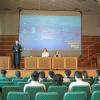EDUC online courses at the University of Pécs
2021
Sep
13
The EDUC (European Digital UniverCity) Alliance is pleased to promote five new online courses for the students of the alliance. The university responsible for the courses is the University of Pécs but they are being organized and developed together with the six EDUC partner universities.The deadline of application is 24 September 2021 (Friday).

Registration: HERE
Application deadline: 24 September 2021 (Friday)
Starting date of the online courses: in the second half of September / in October
Eligible students: enrolled students and of the EDUC partner universities (University of Potsdam, Masaryk University, University of Cagliari, University of Rennes 1, University Paris Nanterre, University of Pécs)
Language of teaching: English
Questions about the application should be directed to the Institutional EDUC Office of the University of Pécs at educ@pte.hu
Titles and descriptions of the courses:
Africa and the new dynamics of the global system (Political Africa Studies 2)
EDUC Journal Club
Discipline: international relations
Course description: Course Aims - The new dynamics of the global system, together with its actors (the newly industrialised economies and the more developed forces at play) and their relevant connections, co-operations with Africa will be in the centre of investigation.
In 2020, Africa celebrated the 60th anniversary of gaining independence from the former colonial powers and nation-statehood (17 territories got independent during the ‘annus mirabilis’, 1960). Many say Africa is the loser of globalisation, but many others think the new forces at play, i.e. China, India, Brazil offer alternative ways of development. In parallel, we witness (due to increased competition on African soil) the rethinking about policies on Africa on behalf of the US, the UK, the European Union, as well as re-engagements of countries of the former Soviet Bloc, including the Visegrad Four and even Russia. Can all these bring real development for Africa? The course will investigate current political processes and events, and will look into Africa’s potential place and role in a possible new world order.
Competencies - Students will have the chance to get more engaged with analysing Africa-related political issues – not only African politics, but e.g. Africa-strategies of China, India, the EU, etc. Students will understand more about the new dynamics of the global world and the changing world order.
Students will be able to critically analyse and evaluate the effects and possible scenarios of the involvement of the new actors in Africa.
Students will develop critical skills in working with different academic sources, mostly scientific journal articles, ranging from American, African to Chinese authors. They will develop both their oral and written argumentative skills about defending their opinions.
Methodology - The course intends to present some fresh perspectives on the “consummate challenges and abundant opportunities” (as Robert I. Rotberg indicated it in the title of his book) of Sub-Saharan Africa and critically look at the “Africa rising” mantra. It will apply an interdisciplinary approach operating with a number of theories of International Relations, Political Science and Social Geography, but also presenting field research experience from sociological and anthropological perspectives.
During the module we will use the “journal club method” and thus, hold educational meetings, in which our group discusses already published journal articles about the central topic of the course. We will improve our skills to be able to differentiate, as Bhattacharya (2017) put it, “a genuine recent advance from a clever but outright harmful rediscovery of the wheel which has been long discarded”. We will look at how to formulate research questions, describe the methods, present the results and the conclusions of the given research. We will better understand how to present our research. At the same time, with the help of some invited journal editors and reviewers, we will learn about the entire editing process, with an emphasis on peer review, and therefore, on how to assess a manuscript.
Language level required: English B2
Starting date and timetable of the course: Friday 1 October 15:30-17:00, 15 October 15:00-16:30, 22 October 15:30-17:00, 12 November 15:00-16:30, 19 November 15:00-16:30, 3 December 15:00-16:30, 10 December 15:00-16:30
Number of ECTS: 3
Multilingual e-learning PhD Educational Resource of Criminal Procedural Law
Discipline: law & political sciences
Course description: Preparation of a criminal procedure e-learning curriculum that covers the entire Hungarian criminal procedure law. The curriculum would be based on Hungarian, ie the videos of the lectures would be made in Hungarian, at the same time English, Italian and Spanish subtitles would be added to the full lecture. This would be facilitated by the publication of my book of criminal procedure law in both English and Spanish, making the body text available. The curriculum would not only help PhD training, but as it would cover the entire Hungarian criminal procedure law, it could also be used in connection with other (eg Erasmus) scholarships. Given that I also advertise seminars in English, Italian and Spanish, it would also help these students prepare.
Language level required: English B2
Starting date and timetable of the course: Monday 13:00-14:20
Number of ECTS: 2
Big Data Algorithm-based/Automated Decision Making in the Public Sector
Discipline: law & political sciences
Course description: The main objective of this course is to develop the pratical skills of the participating students in carrying out real law enforcement and legally relevant activities and to prepare them for the necessary knowledge. In addition, the couse aims to promote students' ability to cooperate internationally and develop their foreign language competence in solving professional tasks. The couse aims to prepare students to deal with problems encountered in practice, to synthetize key legal requirements and literature. In addition, it aims to promote students' ability to cooperate internationally and to develop their foreign language competencies.
Language level required: English B2
Starting date and timetable of the course: Wednesday 13:00-14:30
Number of ECTS: 4
Online Language Assessment Preparation and Practice (Hungarian, English, German – 3 courses)
Discipline: languages
Course description: This online language assessment preparation course in Moodle will be structured around six learning modules for the target language and CEFR level: 1.) Introduction to the ECL Language Examination System at the University of Pecs, 2.) Reading section of assessment, 3.) Writing section of assessment, 4.) Listening section of assessment, 5.) Speaking section of assessment, and 6.) Online Practice Exam. In Moodle, participants will work through a series of pre-recorded screen casts of Google Slide and Prezi presentations to learn more about the content that can expect to encounter on the ECL language exam. They will also have access to PDF files, sample language assessments, and additional online resources to assist in preparation. All modules will include asynchronous resources for EDUC staff and students to work through the productive and receptive skills independently and at their own pace. However, the modules will include the following recommend time (Total Time: 6 weeks/22 hours) to spend on each language learning task in order to successfully prepare for a language assessment in the selected EDUC language.
Language level required: English C1 or German C1, or Hungarian A2
Starting date and timetable of the course: asynchronous course, from October 2021
Number of ECTS:
Online Pharmaceutical Market and the Dangers of Counterfeit Medicines
Discipline: pharmacy
Course description: The course will provide insight into the current issues of the online pharmaceutical market and the dangers of counterfeit medicines. Real world data on legitimate and rogue online pharmacies, various stakeholders, networks, products and information content will be introduced, along with the discussion of measures combating illegal peddling of pharmaceuticals. Novel information technology and data-science methods on the evaluation of this enormous online market will be discussed.
Language level required: English B2
Starting date and timetable of the course: 1st of October (Friday) 13:00-16:00, 5th November (Friday) 13:00-16:00, 3rd December (Friday) 13:00-16:00
Number of ECTS: 1
Introduction to Media Studies (Gap Year course)
Discipline: social & human sciences
Course description: This course intends to give an overall view of the theoretical frameworks to media studies. The lecture is organized around three major didactic issues that follow the evolution and concepts of mass communication through the genre of media to its reception. The first phase of the course introduces the historical development of mass communications, its important concepts and models from the perspective of media theory and social theory. The second unit introduces the audience to the social and formal issues of media content, focusing on media genres. Finally, we review the traditions and experiences of audience theory and audience research, as well as the characteristics of audience formation, with a particular focus on fan cultures. Learning outcomes: by studying this module, students acquire knowledge about media history, media technology, media theories, media contentsand consumption. They will learn about the multiplicity of theories and approaches to mediain the framework of human and social sciences. They acquire a critical attitude towards media culture and media society as well as some practical knowledge about potential beneficial and harmful effects of media contents.
Language level required: English B2
Starting date and timetable of the course: asynchronous course, from the end of September 2021
Number of ECTS: 4
- Log in to post comments
University of Pécs | Chancellery | IT Directorate | Portal group - 2020.
















